Top 13 Google Trends Alternatives & Competitors in 2024

Google Trends gives users insights into the popularity of search queries over time. This tool helps individuals and businesses understand trending topics, offering a look into user interests across different regions. By showcasing data-driven trends, Google Trends helps marketers and content creators make informed decisions for their campaigns. It is a useful resource for anyone wanting to stay ahead in the changing digital landscape.
Google has established itself as a leader in search engine technology, but many alternatives aim to carve out their space in this market. These competitors often focus on distinct features that address specific needs. From privacy to user experience, each option brings something different. Exploring these alternatives can help businesses choose the right tools that align with their goals.
While Google Trends is a great product, it’s always good to shop around and look for alternatives. This article identifies some top competitors and their pros and cons.
Bing

Bing is a search engine developed by Microsoft. It offers a range of features that cater to different needs, making it a viable alternative to Google Trends. Bing’s unique aspect is its integration of various tools. For instance, users can access Bing’s image and video search capabilities, helping them discover trending content visually. Additionally, Bing rewards users with points for daily searches, which they can redeem for products or services, creating an engaging experience.
Bing’s position in the market reflects its commitment to privacy. With concerns around data security, Microsoft has prioritized user privacy, attracting individuals and businesses cautious about how their data might be used by other platforms.
Bing’s story also involves its evolution. Launched in 2009, it emerged from Microsoft’s efforts to compete with Google. Over the years, it has incorporated many updates and features based on user feedback. For businesses seeking insights, Bing offers Visual Search and the ability to explore trends in specific locations, providing localized data that may be lacking in Google Trends.
Bing emphasizes community features. Users can see what others are searching for and access trending searches, which can be valuable for businesses scouting market interests and current topics.
Bing presents a solid alternative to Google Trends for several reasons.
Pros
- Easy-to-navigate interface
- Strong focus on user privacy
- Integrates multimedia search capabilities
- Unique rewards program for users
- Offers localized insights
Cons
- Market share is smaller compared to Google
- Some features may not be as robust as Google Trends
- User familiarity with Bing is still growing
Yahoo

Yahoo has been a significant player in the online space since its launch in 1994. Starting as a web directory, Yahoo has expanded into news, finance, sports, and entertainment. Their goal today is to provide more tailored content that captures user interests, making it an appealing platform for those wanting insights into trending topics.
While Google Trends offers an in-depth look at search behavior, Yahoo provides a more rounded experience by combining search data with curated news and articles. It acts as not just a search tool, but a comprehensive digital hub. Users can explore trending news alongside stock updates and entertainment headlines, offering context to what’s popular. This mix is useful for businesses looking to understand market shifts while also staying updated on news that could impact their sector.
One notable feature of Yahoo is its extensive finance section. Users can track market movements while also engaging with industry news. For businesses, this could mean identifying trends and changes before they become mainstream. Yahoo also features a user-friendly interface with various categories, which simplifies navigation and content discovery.
Yahoo’s news aggregation helps users see trends with real-world context, unlike the raw data from Google Trends. Additionally, the platform’s focus on diverse categories allows users to gain insights from multiple sectors without needing to check different platforms.
Pros
- Integrated news and finance insights
- User-friendly interface with diverse categories
- Contextualized trends with real-world relevance
Cons
- May lack as comprehensive a data set as Google Trends
- Some users may prefer a straightforward trends tool without extra content
- Brand perception might not match those looking for advanced tools
DuckDuckGo
DuckDuckGo is a search engine that has found a unique spot online. Founded in 2008, it prioritizes user privacy, promising not to track searches or personal information. This focus on privacy appeals to users wary of data collection practices common in many search engines, including Google.
As an alternative to Google Trends, DuckDuckGo takes a different approach. While Google Trends shows the popularity of search queries over time, DuckDuckGo delivers results without tracking or profiling. Users can explore trending topics, but they access this information through a privacy-first experience.
A notable feature of DuckDuckGo is its “bangs” system, allowing users to quickly search specific sites by starting their query with an exclamation mark followed by the site’s name. For instance, typing “.w” takes users directly to Wikipedia. This makes exploring trending topics more efficient and tailored. Additionally, DuckDuckGo offers instant answers and a simple interface, making it easy to find information without intrusive ads or trackers.
The story of DuckDuckGo is about a small search engine gaining momentum against larger competitors by emphasizing privacy. It serves as a secure space for those who want to browse the web anonymously, resonating with a growing audience.
DuckDuckGo is a strong alternative to Google Trends, thanks to its privacy-first model, unique search features, and simple interface.
Pros
- Focus on user privacy
- No tracking or data collection
- User-friendly interface
- Efficient search features with bangs
Cons
- Limited trend analysis compared to Google Trends
- Some features may be less advanced
- Smaller user base, potentially less comprehensive data
Baidu
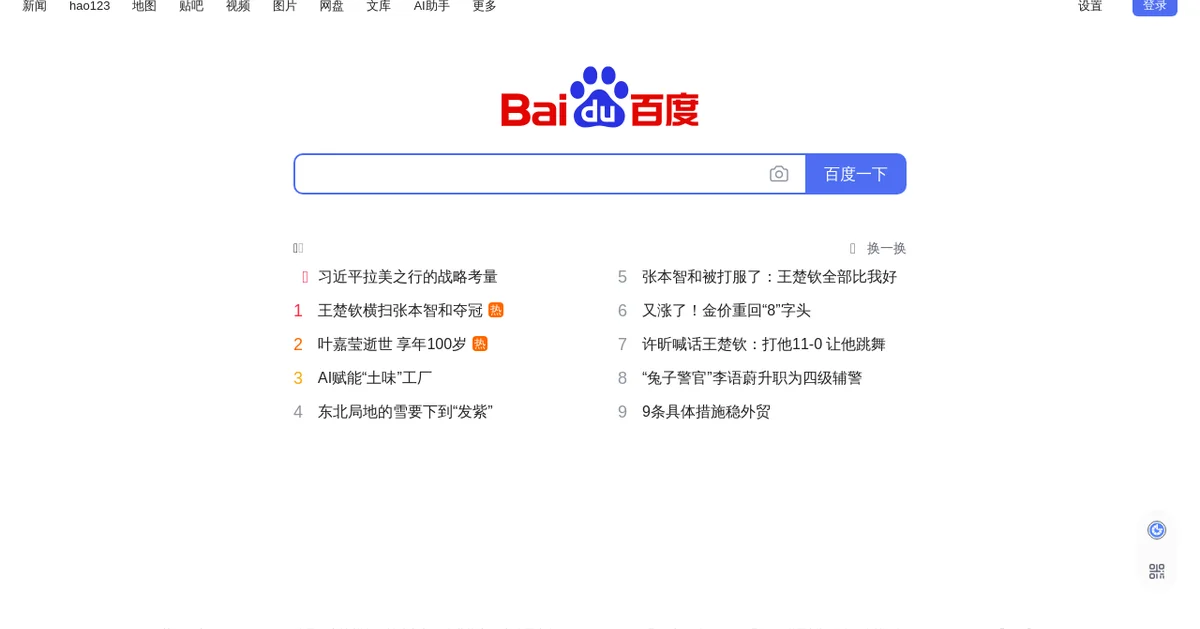
Baidu is a key player in the search engine market in China. Founded in 2000, it quickly became a local alternative to Western search engines like Google. While Google targets a global audience, Baidu focuses specifically on Chinese users, offering a platform designed for local needs and culture.
Baidu Trends provides real-time insights into search queries, helping businesses and individuals understand current topics in the Chinese market. This tool is useful for marketers and researchers looking for trends that connect with local audiences. Baidu’s unique algorithms consider factors like regional interests, making the insights relevant for local campaigns. Users can explore trends in various categories, including news, videos, and topics, giving a broad view of what captures attention on the platform.
Baidu’s strength lies in its integration of AI technology. The search engine uses advanced AI algorithms to refine search results and improve user experience, differentiating it from Google Trends in this area. This focus on AI extends to their advertising solutions, enabling businesses to target audiences effectively. With an extensive range of services—from maps to cloud storage—Baidu serves as a comprehensive resource for many users.
Baidu provides a localized perspective on search trends, improved by AI technology, which can be helpful for those focusing on the Chinese market.
Pros
- Tailored insights for the Chinese audience
- Real-time trend analysis across multiple categories
- Integration of AI for improved results
Cons
- Limited focus outside of China
- May not be as user-friendly for non-Chinese speakers
- Some features could be less prominent compared to Google’s broader ecosystem
Yandex
Yandex is a key player in the search engine landscape, especially in Russia and some neighboring countries. Founded in the late 1990s, Yandex has evolved from a search engine into a tech giant. A notable feature of Yandex is its data analytics capabilities, serving as an alternative to Google Trends.
Yandex Trends allows users to see what people are discussing in real time. This feature benefits businesses and marketers wanting to understand local market trends or track public interest. Unlike Google Trends, which provides a global perspective, Yandex emphasizes regional specifics, highlighting trends relevant to specific areas.
Yandex has a wide range of services, from maps and mail to e-commerce solutions. This ecosystem enables businesses to access multiple platforms without juggling different tools. Integration with other Yandex services allows for easier data collection and analysis.
The company’s origin story is intriguing. Yandex began as a search engine aiming to improve search methodologies and gradually changed into a comprehensive data provider. Their focus on user behavior allows them to offer insights that can be more specific than broader trends.
Yandex provides a localized perspective, making it a useful tool for market research.
Pros
- Strong regional focus, particularly in Russia
- Integrated with other Yandex services for added insights
- Helpful for understanding local market trends
Cons
- Less known outside of Eastern Europe
- Features may not be as extensive as Google Trends
- Language barriers might limit usability for non-Russian speakers
Ask

Ask.com is a search engine that has existed since the late 1990s. It started as a question-and-answer platform, aiming to provide users with clear answers to their inquiries. While it hasn’t kept the same popularity as Google, Ask offers unique features that can attract users seeking alternatives.
One notable feature of Ask is its focus on questions. Users can submit queries in natural language, creating a more conversational search experience. Instead of sorting through many web links, Ask aims to provide direct answers. This can save time and improve user satisfaction, especially for those looking for quick information.
Additionally, Ask allows users to browse through “Top Questions,” which can help content creators and marketers. This feature offers insights into popular queries, creating opportunities for developing relevant content. It serves as an alternative way to observe trends, though on a smaller scale than Google Trends.
While Ask is not a complete substitute for Google Trends, it can address specific needs. Its approach to user queries aligns with a growing demand for conversational interfaces, making it a potential resource for businesses looking to engage with their audience. Whether exploring market insights or searching for quick answers, Ask can be a useful addition to your toolkit.
Pros
- Simple question-and-answer format for quick information
- Focus on popular questions for content development
- Engaging and direct user experience
Cons
- Limited data compared to Google Trends
- Less popular, which may mean fewer up-to-date trends
- May not meet in-depth data analysis needs
Ecosia
Ecosia is a search engine with a twist. Founded in 2009, it aims to change how people perceive and use online search by incorporating environmental awareness into its model. Unlike Google, Ecosia uses its profits to plant trees worldwide—every search contributes to this mission. While you search for trends, you also support global reforestation. This model attracts users who care about the environment and want their online activities to have a positive impact.
Ecosia has features that set it apart. You can view your search history, helping you return to previous trends you explored. The interface is clean and user-friendly, allowing anyone to navigate easily. They prioritize privacy; Ecosia doesn’t sell your data to advertisers, providing users with peace of mind while searching.
The story behind Ecosia is compelling. Christian Kroll, the founder, started the company after visiting a deforested area and feeling the need to act. This personal passion shines through in their mission, creating a brand that resonates with those who want more than just a search engine.
For an alternative to Google Trends, Ecosia’s focus on environmental sustainability and user privacy may appeal to you. It’s not just about gathering information; it’s about making a difference.
Pros
- Environmentally focused with tree-planting initiatives
- Emphasis on user privacy
- Clean, easy-to-navigate interface
- Offers a sense of purpose beyond standard search functionality
Cons
- Not as strong in data analytics as Google Trends
- Smaller user base may affect trend accuracy
- Limited features compared to larger search engines
Startpage
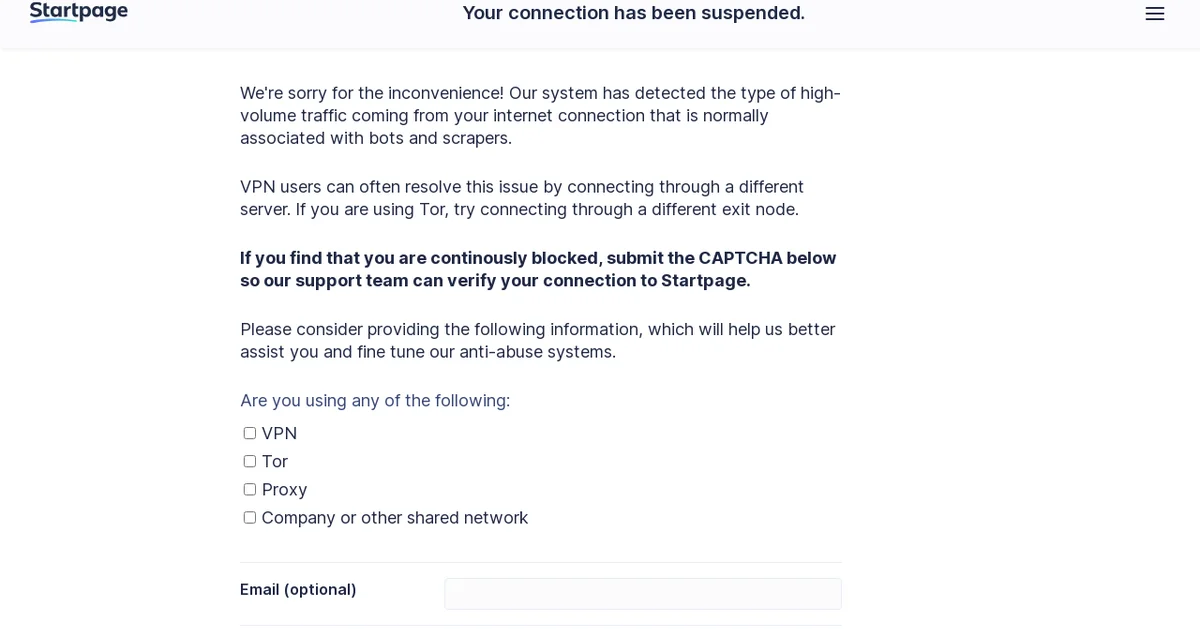
Startpage offers an alternative to Google Trends by focusing on user privacy. Unlike many search engines, Startpage doesn’t track users or save search histories, making it an option for those who want to keep their online activities private. The company emphasizes quality search results derived from Google’s algorithms while protecting personal data. This positioning makes Startpage stand out in the search engine market.
Startpage began with a mission to provide internet users with a safer browsing experience. By using technology to anonymize user data, Startpage ensures that individuals can search without being targeted by ads or price tracking. The Anonymous View feature allows users to visit websites while hiding their identity, reinforcing their commitment to private browsing.
Startpage appeals to users concerned about data privacy, especially where personal information is often collected and sold. With no personal data profiles created and a focus on unprofiled news access, Startpage prioritizes a clean browsing experience. This resonates with privacy-minded individuals and aligns with global movements for data protection.
Startpage respects individual privacy and promotes a browsing experience that is less influenced by past data. For businesses, this can lead to a more accurate interpretation of trends, free from biases created by personal data collections.
Pros
- High level of privacy with no tracking
- Quality search results from Google
- Anonymous browsing capabilities
- No personal data profiles
Cons
- Limited features compared to Google Trends
- May lack some real-time data insights
- Less integration with other Google services
Qwant
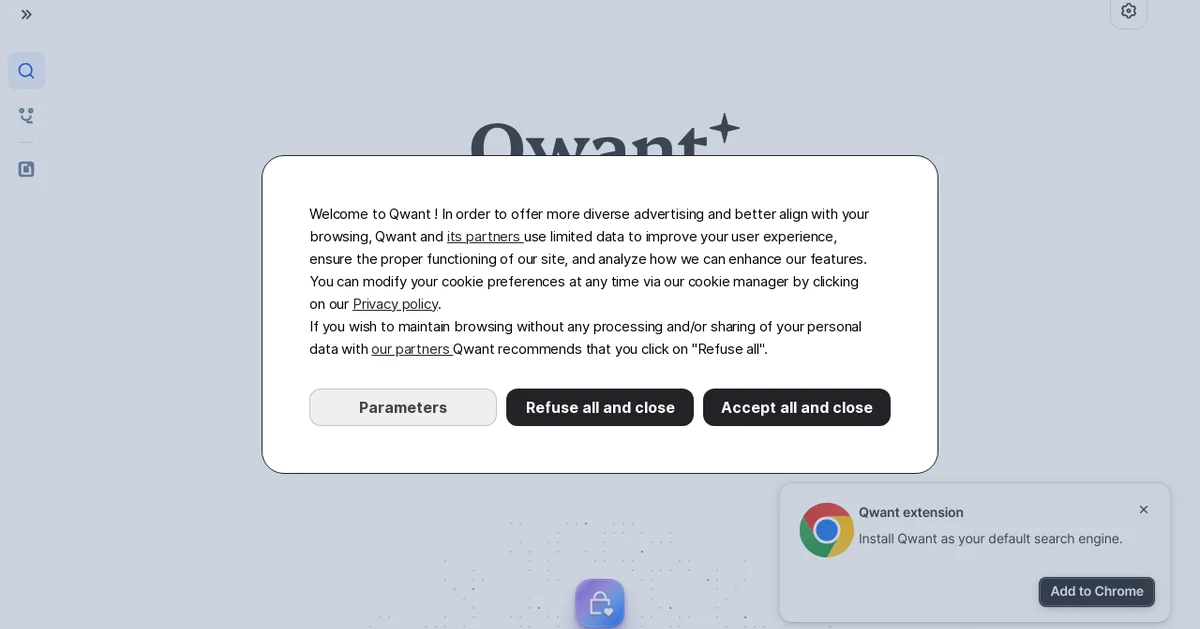
Qwant is a search engine focused on privacy. Launched in 2013 in France, it has gained attention for its commitment to not tracking users or selling their data. This focus on privacy appeals to individuals and businesses seeking a more transparent way to search without the worry of being tracked by ads or data collectors.
As an alternative to Google Trends, Qwant offers real-time trends while maintaining user anonymity. Instead of personalizing results based on search habits, Qwant provides a fresh start for each user. This means that the trends displayed reflect a broader perspective rather than being tailored to past behavior, which can be refreshing.
One of Qwant’s notable features is “Qwant Junior,” designed for children. This version filters out inappropriate content, making it a safer option for young users. Additionally, Qwant’s “Qwant Maps” function allows exploration of geographic trends, which can be helpful for businesses trying to understand regional differences in interests.
Qwant’s privacy-focused approach attracts users who are aware of their data and those looking for an unbiased view of trends. By prioritizing user privacy, Qwant offers a more genuine view of trends in a changing digital environment.
Pros
- Strong commitment to user privacy
- Unfiltered view of trends
- Qwant Junior provides a safe experience for children
- Geographic trends available through Qwant Maps
Cons
- Smaller user base compared to Google
- Limited integration with other services
- Some features may not be as robust as Google’s offerings
Seznam
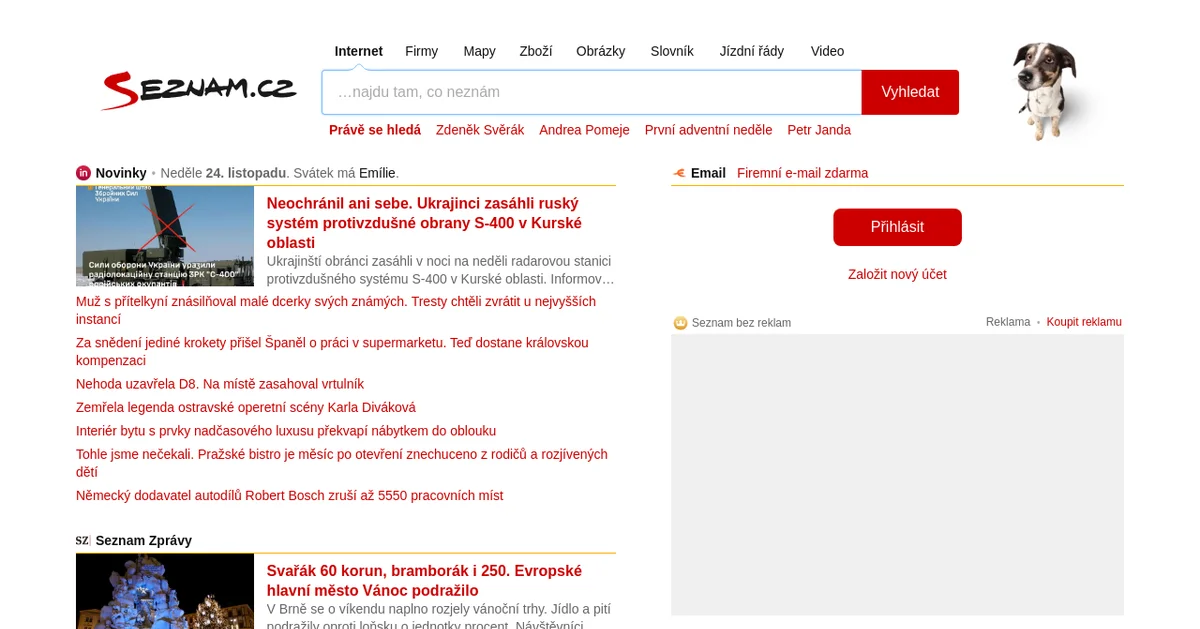
Seznam is a Czech search engine that offers services beyond web searches. Founded in the late 1990s, it aimed to provide an alternative to major players like Google. Seznam acts as a digital platform for local needs, offering local news, maps, job listings, and an online marketplace. This focus allows Seznam to capture regional trends and insights that larger platforms might miss.
Seznam differs from Google Trends due to its integration with local content and services. Users can find specific insights related to Czech trends, along with regional news and information about government policies, events, and cultural happenings. This works well for businesses looking to understand audience behavior in Central Europe. Seznam’s interface includes user-friendly features like maps, photo repositories, recipe databases, and a glossary—services focused on the interests of Czech users.
Seznam also emphasizes privacy and local data protection laws, attracting businesses concerned about data usage. The platform supports various advertising options, helping companies reach their target audience within the Czech market.
Seznam serves as a localized alternative to Google Trends with its focus on regional data, cultural relevance, and privacy. For businesses in or targeting the Czech market, Seznam provides insights that may be missed on larger platforms.
Pros
- Focus on local content and trends
- Variety of integrated services (news, maps, shopping)
- Strong emphasis on privacy
- Tailored advertising options
Cons
- Limited to the Czech market
- Smaller dataset compared to Google
- May not cover global trends effectively
Mojeek
Mojeek is a search engine that is finding its place in a market dominated by giants like Google. It focuses on privacy and independence. The engine doesn’t track user behavior, making it a safe option for those concerned about data collection. For users looking for insights similar to Google Trends, Mojeek’s approach may resonate.
One of Mojeek’s key features is its focus on providing a unique search experience. It has its own index, so the results you see aren’t influenced by algorithms favoring popular content or ads. You can count on varied results with each query. This independence helps users uncover trends and subjects that may not appear in other search engines.
Mojeek’s origin story is intriguing. Founded to provide an alternative to major tech companies, it aims to give users control over their online experience. The team believes everyone should have access to unbiased information without being monitored. Their openness about data handling adds to their credibility as a reliable alternative for discovering trends.
For businesses and marketers seeking different views on search data, Mojeek can be a useful tool. It allows users to see the world from a variety of perspectives. While it may not have the extensive data set of Google Trends, the focus on privacy and unique results can offer a refreshing change.
Pros
- Prioritizes user privacy
- Unique search results from its own index
- Transparent about data practices
Cons
- Smaller data set compared to Google Trends
- Less mainstream recognition
- Less comprehensive trend analysis tools
Sogou
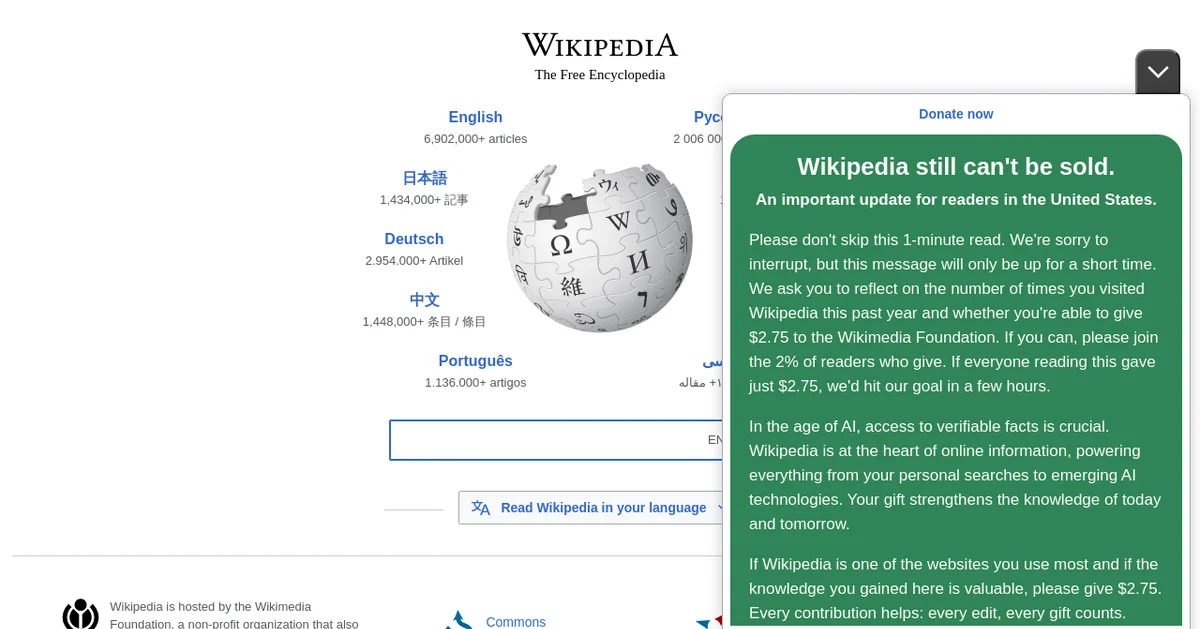
Sogou is a Chinese search engine that offers an alternative to Google Trends, especially for users interested in trending topics in China. Founded in 2004, Sogou gained popularity with its innovative input method editor (IME) that simplified typing Chinese characters, making it a preferred platform for users in a mostly Chinese-speaking digital space. Over time, Sogou has broadened its services and gained a foothold in the competitive search engine market.
Sogou provides real-time data on popular search queries in China. This emphasis on localized content helps users understand what’s trending among the Chinese population, making it a useful tool for marketers and businesses targeting this region. Sogou’s trends feature not only highlights current relevancy but also offers insights into consumer behavior and interests, aiding data-driven decision making.
Sogou combines its search technology with social media analytics, improving its ability to surface trending topics that may not be as noticeable on other platforms. Its partnership with WeChat allows it to access a wealth of user-generated content, providing an advantage in capturing the interests of Chinese audiences.
Sogou provides a distinct view of trends for users in the Chinese market. Its focus on localized data, real-time insights, and social media integration distinguishes it from Google Trends.
Pros
- Real-time trending data specific to China
- Integration with social media, particularly WeChat
- Focus on localized content for targeted insights
Cons
- Primarily serves Chinese-speaking users
- Limited global reach compared to Google Trends
- Data may be less comprehensive outside of China
Wolfram Alpha
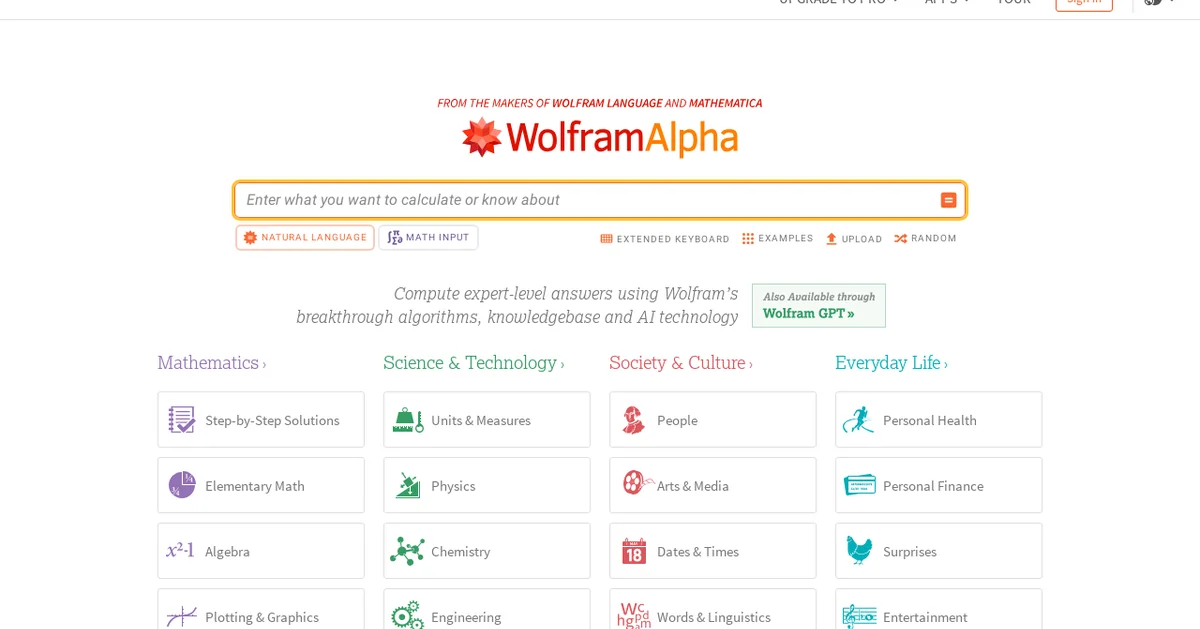
Wolfram Alpha is a computation engine that offers a different approach to understanding trends and data compared to Google Trends. It’s built on years of research and combines natural language processing, curated data, and advanced algorithms. Instead of showing what people are searching for over time, Wolfram Alpha focuses on answering specific questions and providing detailed analysis across various domains.
One of its key features is its ability to compute expert-level answers. You can enter queries in natural language, and it will respond with calculations or generate visual data displays. Whether it’s crunching numbers in mathematics, providing insights on scientific topics, or analyzing social data, Wolfram Alpha aims to deliver accurate and reliable information.
The story behind Wolfram Alpha spans over 35 years, grounded in a desire to make knowledge computable. This foundation sets it apart from Google Trends, which primarily tracks search activity without exploring deeper meanings or calculations. For businesses and researchers seeking specific data, Wolfram Alpha is a valuable tool that cuts through the noise.
While Google Trends offers a broad overview of what’s popular, Wolfram Alpha excels in providing calculated insights. This can be beneficial for those who need structured data for analysis, whether for research, academics, or data-driven decisions.
Pros
- Provides expert-level computational answers
- Supports natural language input for easy use
- Offers detailed analysis across many topics
- Focus on data accuracy and reliability
Cons
- May not track search trends like Google Trends
- Requires more specific queries for best results
- User interface can be less intuitive for casual users